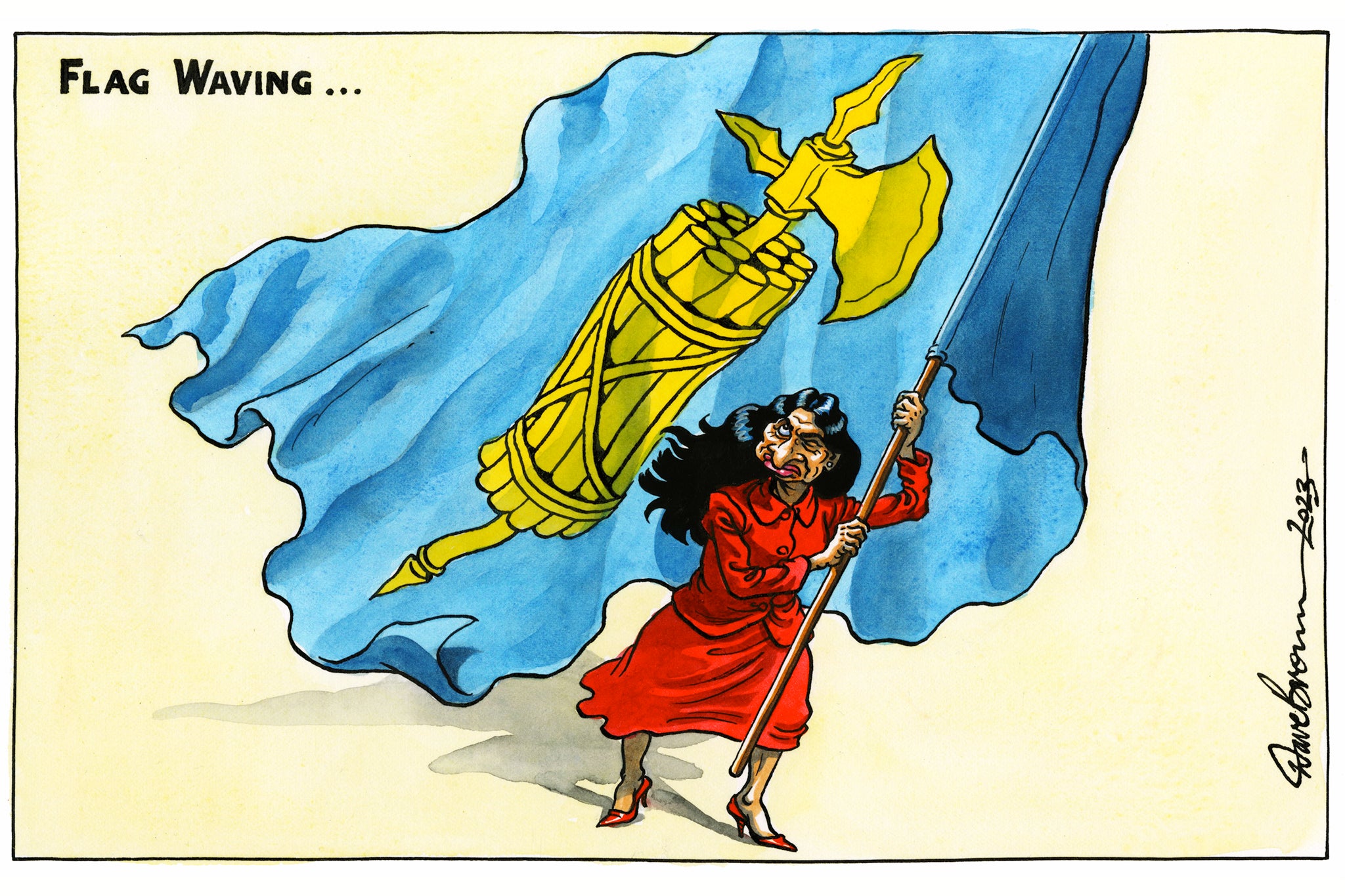Israel must pause and consider the consequences of its righteous retribution
Editorial: If Israel is to retain the international support it so richly deserves, then it must also behave like any other civilised democracy that abides by the rules of war and international conventions

In a country where the party system is kaleidoscopically fragmented and where the average administration lasts a little less than two years, the formation of a national government in Israel is further evidence of a new mood of national unity.
The people of Israel have been left shocked, dismayed, distraught and angered by the barbarous terror attacks by Hamas. There was no justification for what they did, and Hamas could – and did – know that retribution would be swift and forceful. Israel’s main parties – Likud, led by Benjamin Netanyahu, and the centrist National Unity party of Benny Gantz – are joining together in an emergency administration specifically to prosecute their war on Hamas. Any differences in this area of policy have to be set aside in the interests of victory. It is also a show of defiance.
Yet what does victory look like? When Mr Netanyahu vows to “change the Middle East”, what does he mean? Like many leaders before him, he will have more chance of success, that is to say victory, if he defines his war aims – and makes them realistic. The means to victory, and presumably the eradication of Hamas, must also be ones that do not end up strengthening the enemy and becoming self-defeating. This is the challenge now facing the Netanyahu-Gantz government.
If Israel is to retain the international support it so richly deserves, then it must also behave like any other civilised democracy that abides by the rules of war and international conventions. Of course in any war – and this is an unprovoked war of terror by Hamas against Israeli civilians – there will be casualties, and innocent ones. Israelis have died, and Palestinians too, with many more to follow. There has never been a war without civilians getting hurt. Even at this early stage, some 260,000 Palestinians have become displaced persons. Under the siege, everything is in short supply, including water. There is no mains electricity.
The bombardment and a ground invasion will only make matters worse. It will provide Hamas with many more recruits. Israeli ground forces will face formidable resistance – rubble is the worst terrain for an armoured assault backed by infantry. That is the lesson of past such exercises, most recently in Jenin in the West Bank.
This is a moment for Israel to pause and consider the consequences of such a strategy. Already the European Union has condemned the policy as contrary to international law. On his high-profile visit, the US secretary of state, Anthony Blinken, may well have also privately urged caution, while publicly, and sincerely, supporting Israel with any diplomatic, military and financial aid it needs. As President Biden put it, in the face of “evil”, America will have Israel’s back.
The treatment of Palestinian civilians, as distinct from Hamas, is one of legality, of a humanitarian catastrophe, and those should be reasons enough for Israel to act proportionately and under international law. Yet just from the narrow viewpoint of Israeli security interests, it is difficult to see how lasting peace and security for Israel can be achieved by imposing a kind of collective punishment on the Gazans as a whole.
Will such actions make it more or less likely to create even more sworn enemies of Israel ready to be exploited by cynical Hamas leaders and their Iranian minders? If Gaza is obliterated, will (Iranian-backed) Hezbollah stand idly by in the West Bank and southern Lebanon? Will it make the rest of the West more or less likely to back Israel?
Will a disproportionately violent and indiscriminate response make other major powers in the region, such as Saudi Arabia and Turkey, friendlier to the state of Israel? What will the deaths of Palestinian children do to public opinion in Jordan and the UAE, now formally at peace with Israel? How will Egypt, at peace with Israel since 1978, respond to an influx of hundreds of thousands of refugees? There is, surely, a distinction to be drawn here between the people of Gaza and Hamas.
With their tactics, Hamas (and Iran) have used Palestinian grievances for their own ends and pushed Israel into an impossible position. The medieval brutality of the Hamas gangsters reawakens the deepest existential fears of Israeli Jews and invites the expected extreme response. Yet the urban landscape of Gaza, its densely populated neighbourhoods and, above all, its habit of embedding itself in civilian areas makes it hard for Israel to hit back without inflicting terrible suffering on civilians.
If the cowards who kidnapped old ladies and murdered children base themselves in a mosque or in a nursery, what is the Israeli Defence Force to do? Giving a warning in advance to evacuate is the usual Israel protocol – but then the terrorists merely relocate somewhere safer.
The dilemmas are old and insoluble, as with so much in the region. Yet Mr Netanyahu and Mr Gantz, now united, must try and pick a path through the impossible choices in a way that makes Hamas less of a threat and Israel more secure, rather than the other way around. Israel cannot risk losing its moral authority, and its friends, in the cause of revenge. It demands cold, hard determination – and a sense of caution.
A war between the West and Islam triggered by acts of terror is what Hamas and Iran yearn for, just as Osama bin Laden did in the 9/11 attacks. Above all, Israel must avoid falling into that terrible trap.






Join our commenting forum
Join thought-provoking conversations, follow other Independent readers and see their replies
Comments